|
|
|
Biloxi craps
Sunday, February 22 2004
setting: Venice Inn Motel, Venice, Louisiana
The guy in the hotel room immediately adjacent to ours played the Cartoon Network all night long at an incredibly high volume. The substance within the walls at the Venice Inn Motel were hopeless in stopping this noise, and Gretchen and I had to resort to shoving toilet paper up our ears and burying our heads beneath pillows. Believe it or not, this is not the first case I've heard of in which a man (it's always a man) needs to have the Cartoon Network on at full blast while he sleeps. (I'd be interested in reader feedback on this issue.)
Today's destination was some as-yet undecided city along the the Gulf coast. Heading back north on US 23, we stopped at the ruins of Fort Jackson, which withstood some forty days of siege during the Civil War. At first the goal was just to see the Mississippi River (which, though always nearby, had been mostly hidden behind its levee). But the fort was open for tourists, so we crossed its moat and walked around on the ramparts. A bored-looking ranger was there, and he seemed eager to show us "the model room," which was still locked up but which he opened just for us. There were two models, one showing the fort and its defenses and another showing something else which the ranger proved incapable of explaining. In both models, little plastic soldiers crouched on paper maché ramparts and hid behind trees made of a substance that resembled pocket lint. I'd never before seen such amateurish models on such proud display. They looked like the science fair projects of ten year olds, yet every night they're reverently covered with plastic! Also in the model room was a display of a couple dozen years' worth of pageant queen photos from the local Orange Festival. These had nothing whatsoever to do with the Fort or the models, but whatever. They sure do love their beauty pageants in the south! The experience in the model room reminded Gretchen of a phrase used as the name of a band played occasionally on WKZE: Southern Culture on the Skids.
The Mississippi River seemed to have an unusual number of large boats parked along its shore, and later I learned that this morning there had been a shipwreck at the mouth of the river and traffic had been shut down in order to search for survivors. Mardi Gras tourists stranded at sea were being rerouted to other nearby Gulf Coast ports such as Mobile and Biloxi.
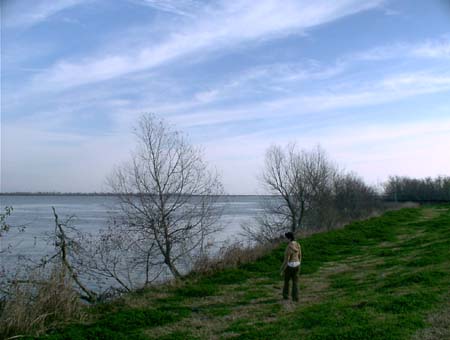
Tbe lower Mississippi River at Fort Jackson.

The moat around the ruins of Fort Jackson.
Mississippi and Alabama, the central Gulf Coast states of the Deep South, each have relatively short coastlines. If you look at a map of the United States you'll see that more than 90 percent of the Gulf Coast belongs to Texas, Louisiana and Florida. Driving along the stretch of coastline east of New Orleans is a little like driving in New England because you're never in any one state for very long.
We headed east on I-10 across the smaller part of Lake Pontchartrain and then into Mississippi. The terrain was swampy at first but quickly turned into a nearly featureless expanse of pine forest.
We continued on all the way to Mobile, Alabama. Gretchen was driving and wanted me to find a street map of Mobile in the AAA Guidebook (which we'd found at the Whitney House), but there wasn't any such map. Gretchen refused to believe me and went so far as to bet me that she would be able to find it. She then pulled over on the side of the interstate and systematically hunted for it. It really wasn't there; there must have been some sort of editorial fuck up.
Mardi Gras is one of the first things that comes to mind when you think about New Orleans. Originally a French celebration, its celebration in the United States actually had its origins in Mobile, Alabama, a fact which Mobilians are quick to point out. It just so happened that today was the day of Mobile's biggest Mardi Gras parade. The parade route was all mapped out and lined with metal police barricades, and people had set up camp all along it. Barbecues were lit and cases of beer were stacked beneath foldout tables.
We parked on the edge of downtown Mobile and walked into the center of the city. It was a beautiful day for a parade. It was so beautiful in fact that it provided its own argument for why Mardi Gras is so popular along the Gulf Coast. Nobody down here can muster much woo-woo enthusiasm in the oppressive heat of, say, July 4th. (This brings up another interesting point: there weren't any more American flags down here in the heart of Bush Country than I'd seen in Greater Woodstock. Perhaps they rot away faster in the hot Gulf Coast sun.)
The most striking thing about downtown Mobile is the empty storefronts. Only about half the available retail space is occupied, and some that is in a state of ruin. The place is in desperate need of gentrification. Perhaps the thing standing in its way is the South's traditional intolerance for homosexuality. Add a few mid-century modern antique stores, a hip Mexican restaurant, an alternative video store, and a gay wedding chapel and real estate prices would quadruple.
Actually, we did manage to find one lesbian bar along the parade route. We also found a black-owned art gallery, but a drunken parade reveler in the all-white crowds out in front had just smashed in the plate glass of its front door. As we passed, the owner and his family were cleaning up the shards with fatalistic ambivalence. Old habits die hard, particularly in the south.
We also found a Thai restaurant, and it came as such a culinary oasis that it was where we ate lunch. The guy who served us seemed to be performing as a stereotype: the grinning, obsequious oriental. Perhaps this was a necessary survival technique in this part of the world. Somebody in the Thai restaurant had shrewd business acumen, because they'd set up a table in front of the store and staffed it with a fun-looking white guy selling beers by the can. The Thai restaurant staff kept resupplying him with cold cases from the walk-in refrigerator in the back. As in New Orleans, it seemed to be legal to drink in public in Mobile, at least on Mardi Gras.
We found our way to the beginning of the parade route and then stood there while the whole thing passed. There was something very addictive about trying to catch the beads that were tossed, at least for me. Gretchen seemed to get tired of it a long time before I did.
The floats for the Mobile Mardi Gras weren't anywhere near as elaborate as the floats we'd seen in New Orleans. They usually consisted of several layers of wooden framing, all lavishly decorated with bunting and ribbons, but there were few large sculptures, and the people on the float didn't wear masks or otherwise try to conceal their identity. (I've heard that this New Orleans tradition had its origins with mixed-race krewes that wanted to avoid the onus of the anti-integration tabboo.) Nearly all of the people in the parade appeared to be white, as were the crowds in downtown Mobile.
But at some point as we walked west out of the center of the city there was an abrupt change and the crowds along the parade route became almost entirely black. I've never seen such strong self-segregation anywhere else.
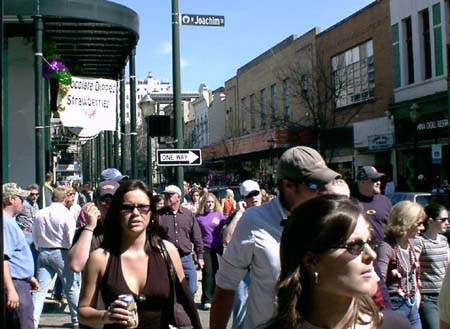
Street scene in downtown Mobile, Alabama.
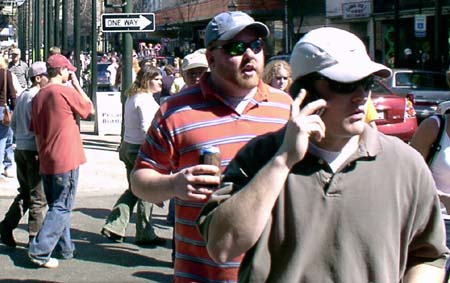
More Mobile.
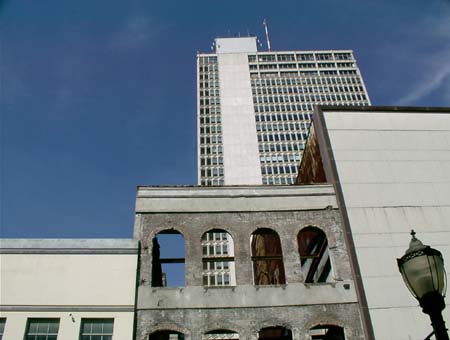
Mobile's lone skyscraper viewed through a crumbling husk of an older building.
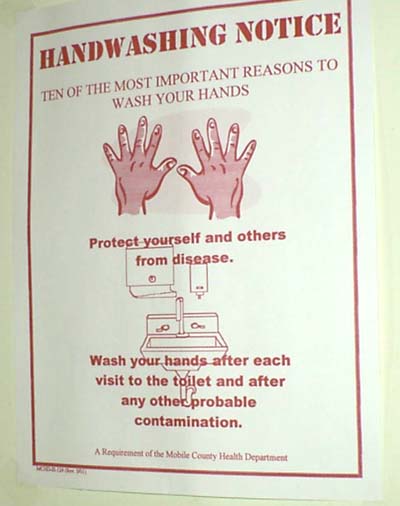
Sign in the men's room at downtown Mobile's Thai restaurant.
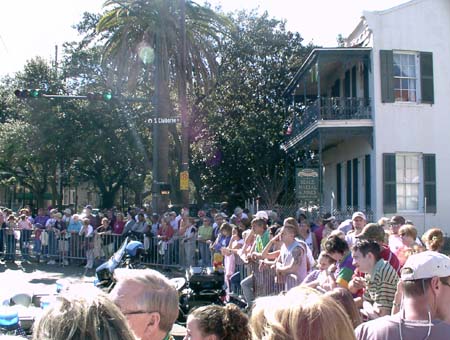
The beginning of Mobile's Mardi Gras parade route.
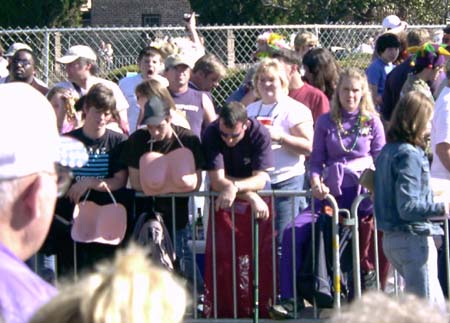
Donning fake rubber tits in an effort to get more beads. There's actually a black gentleman in this photo.

A rainbow in the clouds over coastal Mississippi.
Mobile was as far east as we ventured on this trip, though Pensacola, Florida (the "Redneck Riviera") was only fifty miles away. Heading back west along the scenic coastal route (US 90), we eventually stopped in Biloxi, Mississippi. Tonight we'd be having an entirely different sort of adventure. We'd be blowing money in a casino.
Mississippi has the distinction of being the poorest state in the richest country in the world. All sorts of solutions have been tried, some more successful than others. Aquariums and ball parks can only go so far when a place takes a firm stance as gay-unfriendly. Poverty is often a consequence of ignorance, and nothing says ignorance quite like "Creation Science."
But there is one way to exploit ignorance in the form of lucrative tourist traps: casinos. For their success they depend upon a widespread lack of basic mathematical understanding. The poorer the educational system, the more money they rake in. If a state spends no money at all on education, it can afford to pay all its citizens a stipend from the casino taxes it collects.
Mississippi approved casino gambling about ten years ago, and now most of its cities feature prominent casino districts. The casinos aren't anywhere near as flamboyant as those in Las Vegas, but they serve the same purpose: to winnow the chaff of people away from the wheat of their money.
We checked out the hotel options in the cluster of casinos located near the long bridge from Jackson County. Most had pools and hot tubs and two had the same nightly price of $99. The Isle of Capri Casino was only $59/night, but the woman at the desk wouldn't know if any would be available until 7:30pm. So we had time to kill.
The Isle of Capri Casino wasn't as classy as its neighbor to the west, and the food in its buffet looked equally colorless and overcooked. But if we stayed their we could justify an extra $40 worth of gambling. Not that we were being mathematically foolish, but the idea here was to have a full casino experience and get our money's worth in entertainment value from the cash we would be blowing. I'd never really been in casino before, unless you count that time I played a slot machine in the Las Vegas airport.
Our first activity in the Isle of Capri Casino was to inspect the buffet to see if there was anything Gretchen could eat. With this in mind, we both slipped past the queue of people waiting to pay for the buffet and then realized that we might have just snuck in for free. Gretchen was a little worried that we'd need a receipt, so she simply took one from one of the tables nearby. Not really sure how the buffet worked, she asked an employee with a broom in his hand because he didn't look like he had much of an interest in the profitability of his employer. Unfortunately, he quickly referred us to his manager, a white guy whose interests were obvious. But he was so steeped in a "the customer's always right" mindset that Gretchen had no difficulty snowing him with the recycled receipt. In so doing we saved $15 each. Now we could turn our attention to the food.
The bufffet was the sort that could easily be oversold in a promotional brochure. There was a wide array of meat and exotic seafood options, and if one was looking for something deep-fried he'd probably do okay. But the state of the food was another matter. As mentioned before, everything (including the vegetables) had lost color and form from either age or excessive cooking. The broccoli looked especially sad, particular to anyone familiar with the intense green that the freshly-steamed form has. The whole thing was kind of nauseating for Gretchen. But she was hungry, so she held her nose and got a few things. For my part, I focused mostly on fish. Neither of us were pleased with the things we ate. Gretchen's two pasta salads seemed to melt into protoplasm by the time she got them back to our table. And my fish had become dry and leathery and the flavor was all wrong. But Gretchen was pleasantly surprised by her dessert round; she found the cherry cobbler delicious.
After proving at the entrance that we were 21 or over, we killed more time down among the slot machines in the subterranean bowels of the casino. We walked around a little among the machines initially and Gretchen pointed out some environmental factors common to gambling spaces. Such spaces always lack clocks or windows, allowing people to lose track of the flow of time. Without knowing how long they've been gambling people can also lose a sense of how much money they've lost, particularly when playing from plastic cards connected to their credit ratings. As for the gamblers themselves, particularly those at the slot machines, Gretchen pointed out their uniformly blank expressions. Gambling for them was strictly business, and they were never visibly upset about losses or elated from wins.
After awhile we tracked down some quarter slot machines and began blowing our money that way (since it was the lowest-stakes version of the only "game" we knew how to play). You drop a quarter in, pull the crank, lose the money. Over and over again. There's nothing the slightest bit entertaining about this. Oh sure, sometimes you get four or five quarters back, but the whole process seems to take place beneath a desperate, anti-social cloud.
When we finally were able to check into our room, Gretchen changed out of her greying white tee shirt into vampy city attire. She'd been underdressed for the casino, but now she was clearly overdressed. (I didn't change at all because I'd been wearing my usual business casual all day.)
When we returned to the casino we were determined to learn a real table game, preferably craps. Three crap guys (I don't know enough about this stuff to give their job titles) were just starting a table up, and when we said we wanted to learn they told us they'd help us out. So we learned the basic logic of the game. The house reserves certain high-probability dice outcomes for itself and we, the players, get everything else. Since the house's odds aren't dramatically higher than that of everyone else, one can experience real runs of good luck while playing. But the best of all, craps is a social game. It's inevitable that players around the crap table begin socializing with one another. And when you throw a good combination and everyone but the house benefits, temporarily you're a hero.
To our right was Val, a thin 70 or 80 year old woman from West Palm Beach dressed entirely in red. Gretchen took an immediate shine to her and eventually gave her the huge fake ruby ring she was wearing. To our left was a middle-aged cajun guy from some small town in Louisiana. He kept explaining the various odds to me in his impenetrable accent, good-naturedly insulting Val, or shouting out a French expression ideally suited to crap playing, "Laissez les bon temps roulez!" Sometimes when we'd run low of chips Val would give us one of her $5 red chips. That's the kind of fast friends one makes around a craps table. It seemed lightyears less psychologically ruinous than playing a slot machine.
Aspects of the casino experience are too absurd to be believed unless experienced. A waitress came around to our craps table repeatedly to fetch us free drinks (something that didn't seem to be happening in the vicinity of the quarter slot machines). Her outfit was such that her breasts were thrust up into my face as she took my order, an enviably perky round rump positioned just beneath her face, complete with ass crack. Following Gretchen's advice, I paid her tips in white one dollar poker chips.
Meanwhile a woman sang country songs from a stage overlooking the gambling floor. Behind her loomed an enormous indoor rock formation while on either side there were hollow illuminated palm trees glowing like space aliens. It was both comically surreal and existentially depressing to see her in elevated the distance holding that microphone and doing her best to be a performer while the tired and desperate blocked out all but the blowing of their money.
We called it quits at around my third free Budweiser. In total we'd managed to blow about the same amount of money as we'd saved by staying at the Isle of Capri instead of some other casino.
Hotel rooms in a casino are not designed to be attractive places to stay. Perhaps this was why the art hanging on the wall was a lot more interesting than the art one normally finds in a hotel room. (I can imagine Great Aunt Ethel taking a look at it and saying, 'George! This painting is disturbing my 1950s-era sensibilities! Let's get back down to the casino!) For similar reasons, the cable teevee variety were somewhat limited. If we wanted to watch porn, play a video game, check our email, or watch anything besides basic cable, we'd have to pay. It makes sense for a casino to have lots of ways to spend money so they can immediately recoup some of the losses from people who win big.
For some reason Gretchen spontaneously decided to pay $13 so we could watch a porno movie. One of the pornos was called All Sex, No Plot and this gave Gretchen the mistaken impression that the other movies actually had plots, something she likes in a porno. So she selected a movie called My Neighbor the Nympho. Not only did this "movie" lack a plot, it turned out to be soft-core porn. The sex all appeared to be simulated and we never once saw an erect penis.
For linking purposes this article's URL is:
http://asecular.com/blog.php?040222 feedback
previous | next |








